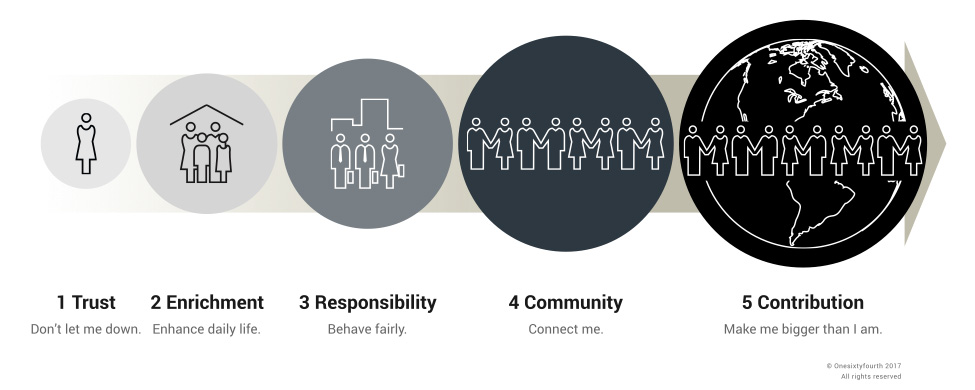To address peoples’ rising desire for the world to work better, companies are seeking new ways of engaging and new ways of doing business. While more and more have the will to create progress, many have not yet figured out how to do so. They struggle to integrate sustainability, environmental, and social initiatives into their corporate mission and to develop a more meaningful purpose. For many executives, activities related to corporate social responsibility, environmental sustainability, and doing good still feel in conflict with the traditional business mantra that Milton Friedman popularised in the 1970’s in a New York Times article, and that has dictated corporate behavior for decades: The primary purpose of a corporation is to maximise profits and shareholder value.
Yet, globalised sourcing, production, sales and social media all insist that business success be dependent on meeting the needs of a wide range of stakeholders. Today, the goal of doing good and becoming a sustainable business is a practical and necessary investment into growth. This is the new model of Brand Citizenship. A holistic principle that equips businesses to balance social and financial value.
The rules for business are shifting with the Zeitgeist
Three years of qualitative and quantitative investigation with more than 6000 people demonstrated that an increasing and vocal number of people feel the shareholder model for value creation is out of step with modern society. Many indicated that it was time to stop artificially separating economic and social value. As one research participant aptly stated: Many companies believe they have a responsibility to “give back” to society and to me. This is wonderful—in the future … all [businesses will] have to give to get.”
Today, there’s a growing call on Wall Street and in The City for a greater focus on delivering value over the long-term, and for companies to make a positive contribution to society in order to be successful over time. Larry Fink, Chairman and CEO of BlackRock global investment corporation, and Jamie Dimon, Chairman, CEO and President of JP Morgan Chase, are among the most prominent evangelisers of this movement.
The ME-to-WE Continuum of Brand Citizenship
My three years of research further highlighted that people believe responsible corporate behavior spans across a five-step, ME-to-WE continuum of Brand Citizenship. It begins with delivering value to individual people (ME) and then moves outward to delivering added value to society: the collective WE.
THE FIVE-STEP ME-TO-WE CONTINUUM OF BRAND CITIZENSHIP
The five steps of Brand Citizenship logically flow from one another:
1 TRUST: DON’T LET ME DOWN
First and foremost, brands must deliver on their promises. Digital communications and information have made reciprocity one of five key requirements for fostering trust. Farrow & Ball’s The Chromologist is a fun example of this. Through this blog, the seventy-year-old paint-and-wallpaper supplier offers a deep dive into the world of colour in art, decoration, food, fashion, literature, and more.
2 ENRICHMENT: ENHANCE DAILY LIFE
People identify more with—and are less price sensitive toward—brands that help them simplify routines, make mundane tasks less dull and inspire daily life. The baby food manufacturer and public benefit corporation Plum Organics enriches parents – and their babies – with wholesome foods, packaged in innovative, environmentally friendly ways. The brand’s focus on nutritional intelligence, Parenting Unfiltered initiative and The Full Effect® social impact program all cultivate a loyal following.
3 RESPONSIBILITY: BEHAVE FAIRLY
In a post-recession, flattened, and transparent world, customers expect brands to treat their employees fairly, behave ethically, and be proactive in their business practices. Waitrose puts employees (partners) at the centre of its success. It continually balances innovation with the needs of customers, partners, its ethical supply chain and other stakeholders as it adapts to remain relevant in a fiercely competitive market.
4 COMMUNITY: CONNECT ME
Brands that rally communities, motivate behavioural change and fix social problems – provided they are not overtly political – attract more loyalists. The mobile operator Giffgaff has built a highly successful, award-winning brand in the competitive telecom space by creating a community based on fair pricing, an online forum at the center of its network, and reaching out to customers in a variety of creative, entertaining, and practical ways.
5 CONTRIBUTION: MAKE ME BIGGER THAN I AM
Brands that play an active role in creating a more positive and life-enhancing future attract fans by improving life on the planet. Lush fresh, handmade cosmetics is the outcome of its founders’ determined journey to live their personal purpose and embody the positive side of activism. The brand continually expands its reach and how it connects loyalists to sustainable products, fair trade, and philanthropic causes.
The new model for balancing value
Brand Citizenship isn’t about a company sacrificing to better the world. Nor is it boasting about doing good. It’s a five-step model that integrates doing good activities—such as fair employee policies, corporate and social responsibility (CSR), sustainability programs, ethical sourcing, and charitable giving—with brand development to strengthen reputation, foster greater loyalty, and enhance both social and financial value.
With more than 25 years of experience as a global brand strategist, Anne Bahr Thompson is an accomplished researcher, writer and speaker, and the pioneer of the strategic framework of Brand Citizenship®.
A former executive director of strategy and planning and head of consulting at Interbrand, the world’s leading brand consultancy, Anne founded Onesixtyfourth, a boutique consultancy, to integrate cultural shifts & a social conscience into brand development. Her writings have appeared in Economist Books, hbr.org, The Guardian, Brand Quarterly, Bloomberg News, and many other publications.
Anne’s new book, DO GOOD: Embracing Brand Citizenship to Fuel Both Purpose and Profit, is available in stores and online now.






